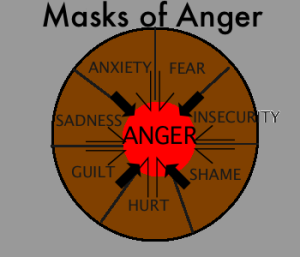Contents
- 1 What Is Anger?
- 2 What Causes Anger?
- 3 Is Anger Dangerous?
- 4 Anger In The Workplace
- 5 Why Controlling Anger Is Important?
- 6 How Can I Avoid Anger?
- 7 How To Control Getting Angry At Someone?
- 8 What to Do If You’re Angry All the Time?
- 9 How To Deal With A Partner Who’s Always Angry?
- 10 Therapy For anger management
- 11 Conclusion
- 12 A Word From Therapy Mantra
What Is Anger?

Anger is defined as a strong feeling of displeasure and hostility. It is usually accompanied by feelings of frustration, irritability, or aggression. Anger can be caused by a variety of things, such as stress, frustration, and disappointment. It can also be sparked by events or situations that we perceive as threatening or unfair.
There are different types of anger, such as the “hot” type, which is characterized by intense feelings and aggressive behavior, and the “cold” type, which is more passive and often manifests as resentment or withdrawal. Anger can also be classified according to its triggers: personal (based on our own feelings or experiences), social (based on how we interact with others), or circumstantial (triggered by events).
What Causes Anger?
 There are many different things that can cause anger.
There are many different things that can cause anger.
Some of the most common causes are-
- Stress
- Frustration
- Disappointment
- Mental Disorders
Events or situations that we perceive as threatening or unfair can also trigger anger.
Anger can also be caused by our own feelings or experiences, such as when we feel neglected or ignored. Social factors, such as how we interact with others, can also trigger anger. And finally, anger can be sparked by events or situations that are external to us, such as natural disasters or traffic jams.
Is Anger Dangerous?
Anger can be dangerous if it’s not controlled. It can lead to destructive behavior and, in some cases, violence. Anger can also cause problems in our personal lives and our careers. if you get angry too much, you may have difficulty forming friendships, because people don’t tend to put up with the frequent displays of hostility that uncontrolled anger can create. If you feel that this feeling is out of control, or if you have already caused harm as a result of your temper, it’s a good idea to talk with a professional about getting help.
Anger In The Workplace

Many people have trouble controlling their anger at work because of bosses, coworkers, or project deadlines. When you feel angry in the workplace, take the following steps to reduce your anger:
Write down what set you off Put it in perspective Identity solutions Count to 10 before saying something cruel or unfair Talk to a coworker Stop and think about what action is really needed Calm yourself with deep breathing Take a time out Talk to someone impartial Keep track of how often you are irritated at work Do relaxation exercises Think positive thoughts Accept unfair circumstances
If you are constantly angry because you can’t control your temper, make an appointment with a healthcare professional. Anger can be a sign of an underlying medical condition, such as depression.
Why Controlling Anger Is Important?

Anger is a powerful emotion that can cause people to do things they normally wouldn’t do. It can also lead to destructive behavior and, in some cases, violence. It can be helpful or harmful, depending on how it’s used.
Being able to control anger is important for everyone. It helps you maintain your emotional balance, which can help you keep a job and be successful in life.
The important thing to remember about anger is this: if left unaddressed, it will escalate. Anger needs to be controlled before it controls us — before we act impulsively lash out at others without thinking about the consequences of our actions. So, take some time to reflect on your anger issues and learn how to control them before you end up regretting something that could have been prevented altogether.
It’s important to learn how to control anger before it gets out of hand. There are a number of techniques that can help, such as deep breathing, visualization, and relaxation exercises. Taking some time to calm down can help you avoid saying or doing something you’ll regret later.
How Can I Avoid Anger?

There are several things you can do to learn how to deal with and control your anger:
Learn Your Triggers
Once you know what sets off an angry outburst from you, then you will be able to predict when one might occur and take steps to prevent it before it does. For example, if spending too much time in traffic makes you angry, find an alternate route to work.
Turn Your Anger Into Something Positive
After you learn what triggers your anger, use that information to make yourself less angry in the future. If spending too much time in traffic makes you mad every day, find a way to make the drive less stressful — listen to your favorite music or an interesting podcast, for example — so when you get behind the wheel again, you won’t feel as irritated.
Pace Yourself
It’s easy to blow up when things aren’t going our way, but learning how to deal with this is important. Take a step back and evaluate the situation before reacting; give yourself some time to cool down if necessary. Go for a walk, take deep breaths, meditate… do whatever it takes to regain control over your feelings.
Avoid Getting Upset About Uncontrollable Things
It’s easy to get angry at the world for not operating the way we think it should, but that just isn’t productive. Wasting time and energy on angering yourself over something you have no control over is a waste of valuable resources; rather than dwelling on what you can’t change, focus your attention on what you can do so that, when faced with similar situations in the future, you’ll be better equipped to do so successfully.
How To Control Getting Angry At Someone?

Controlling your anger is important because it helps you maintain your emotional balance. If you are able to control your anger, you are better able to keep a job and be successful in life. There are many things that can help you learn how to control your anger.
Think Before Acting
For example, if somebody does something that angers you, think about the situation before acting on your feelings. If another person is responsible for triggering your anger, do not confront them while angry—you may say things you don’t mean or lash out physically or verbally at the other person, harming yourself or someone else in the process. Instead of saying what’s on your mind when angered, let time pass before talking with the person who has made you angry. Or, if you are unable to confront the other person about how they made you feel, write down your thoughts and keep them in a journal for safekeeping.
Recognize If Your Anger Is Healthy
It is also important that you recognize when anger is appropriate or healthy, and when it isn’t. Anger can be helpful—for example, it may help motivate you to solve problems with someone who has angered you. However, some people use anger as an excuse to lash out at others or break rules.
Take Your Time
It is important to remember that there are appropriate times to express anger, which includes saying things like “I’m angry” or “that makes me very angry,” but also inappropriate times, such as while driving on the road or while using machinery. If you are struggling with the management of it, it may be helpful to talk with your doctor or a therapist.
Seek Professional Help
People sometimes struggle with anger all the time. They can’t seem to calm down no matter how hard they try and often lash out at others in an attempt to deal with their feelings. If you are struggling with chronic or intense anger, it’s important that you see a doctor for assistance because this could be a sign of a more serious problem such as anxiety disorder. Many people find relief from chronic anger by exercising more, eating healthier, and getting plenty of sleep every night.
What to Do If You’re Angry All the Time?

If you feel angry most of every day there is probably at least one thing causing it. also may be difficult for you.
- To help you figure out how to deal with your anger check out the following list, which outlines what you can do if you are mad all the time.
- Is there anything that triggers your anger? If so, try to avoid those things or think about how you will react before encountering the situation.
- If someone angered you, take some time before confronting them to cool down and calm yourself down. In case this is not possible, write down your feelings in a journal.
- Exercise for at least 30 minutes every day to help reduce stress and release anger/frustration. Try different exercises such as walking or biking for different effects on calming emotions. Eat healthy food and get plenty of sleep.
- Write your feelings down in a journal, and express yourself creatively through listening to music or drawing.
Anger is a normal emotion that serves as a warning sign that something is wrong, although sometimes we can struggle with managing our anger and it may even become unhelpful. Learning how to control our anger, especially when we are mad all the time, can be difficult but there are many things you can do to cope with bouts of anger. If you feel like you need assistance dealing with chronic anger, please see your doctor immediately. It’s important you’re able to calm yourself down if this is an issue for you because uncontrolled anger can lead to problems at work or school, harm relationships, or even spark problems with the law.
How To Deal With A Partner Who’s Always Angry?

When you are constantly living with or around someone who is always angry, it can be difficult to know how to best deal with them. The following tips may help:
1. Try to stay calm and understanding. It’s important not to get drawn into the anger and instead remain levelheaded.
2. Don’t take their anger personally – remember that it’s not about you, it’s about whatever is making them angry.
3. Communicate with each other as openly as possible, and try to stay solution-focused rather than getting wrapped up in the problem.
4. If things continue to be a problem, it might be helpful to see a therapist or counselor who can help mediate the situation.
5. Remember that you love them and want to be there for them, but setting boundaries about what is and isn’t acceptable is also important. Some limits might include:
- Setting time limits on how long they can talk about problems
- Setting a curfew if they’re drinking
- Not allowing them to drive if they’ve been drinking
- Not putting up with physical or emotional violence
- Asserting yourself without being threatening
6. If the situation becomes dangerous, it may be time to distance yourself from your partner for your own wellbeing and safety.
Remember: Everyone gets angry sometimes, but this doesn’t mean we have a problem with anger! However, if anger is controlling our life – it’s a good idea to seek help from a therapist, counselor, or coach.
It’s a good idea to remember that life isn’t always going to go our way and that no one is in control. Sometimes we have to accept that the situation sucks, but we will get through it and be okay.
It is important that you don’t respond to your partner in the same manner that he or she responds to you. It will only escalate bad feelings. Here are some ways to defuse anger when it arises in your relationship:
- Take responsibility for any role you may have played
- Say how what made you feel or act Use “I” statements
- Calmly say why this behavior hurts your feelings
- Don’t take everything so personally
- Communicate with each other
- Assert yourself without being threatening
- Focus on solutions rather than problems
- Accept that conflict is part of relationships
- Remember you still love each other
- Maintain clear boundaries with one another
- Apologies for your part in the fight Give your partner space
Therapy For anger management

Anger management therapy can be extremely helpful for those who struggle with anger issues. The main goal of the therapy is to help the individual learn how to control their anger, identify the triggers that set them off, and find healthy ways to cope with their emotions.
Some of the techniques for anger management therapy include:
- Cognitive-behavioral therapy (CBT) – This type of therapy helps the individual identify and change the thoughts and beliefs that contribute to their angers.
- Relaxation techniques – These can help calm the body and mind, which can help reduce feelings of anger.
- Behavior modification – This involves changing the way you behave when you feel angry, such as using relaxation techniques or counting to 10.
- Social skills training – This involves learning how to interact with others in a healthy way.
- Biofeedback – This helps the individual learn how to control their body, such as breathing and muscle tension, which can help reduce feelings of frustration.
- Anger management classes -So many communities and clinics offer these classes. And focus on making changes through practicing anger management techniques in a supportive environment with others who have similar struggles.
Conclusion
Anger is a natural emotion that we all feel from time to time. However, if anger is constantly ruling our lives, it might be helpful to seek professional help. In this article, we’ve outlined some steps you can take to deal with anger both in yourself and in your relationships. Remember that it’s important to stay calm and understanding when dealing with someone who is angry. And to focus on solutions rather than problems. If the situation becomes dangerous, it might be time to distance yourself from your partner until things cool down.
A Word From Therapy Mantra
Your mental health — Your psychological, emotional, and social well-being — has an impact on every aspect of your life. Positive mental health essentially allows you to effectively deal with life’s everyday challenges.
At TherapyMantra, we have a team of therapists who provide affordable online therapy to assist you with issues such as depression, anxiety, stress, workplace Issues, addiction, relationship, OCD, LGBTQ, and PTSD. You can book a free therapy or download our free Android or iOS app.


